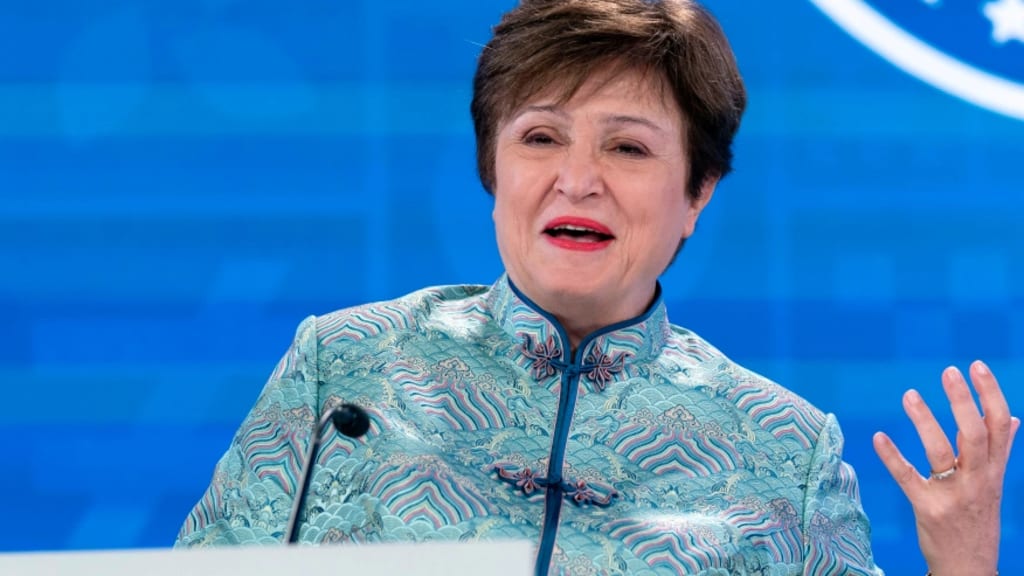IMF Head Welcomes Europe's Interest Rate Hikes in Campaign Against Inflation
Inflation has been a growing concern for economies worldwide, and Europe is no exception.

IMF Head Welcomes Europe's Interest Rate Hikes in Campaign Against Inflation
Outline:
Introduction
Understanding Inflation and Its Impact
The Role of Central Banks
Europe's Response to Inflation
The IMF's Perspective on Interest Rate Hikes
Benefits of Interest Rate Hikes
Concerns and Challenges
Conclusion
Frequently Asked Questions (FAQs)
Article:
Introduction
Inflation has been a growing concern for economies worldwide, and Europe is no exception. As economies strive to maintain stability and sustainable growth, central banks play a crucial role in managing inflation. Recently, European countries have taken steps to combat rising inflation through interest rate hikes. This article explores the International Monetary Fund (IMF) head's perspective on Europe's interest rate hikes and their potential impact on inflation.
Understanding Inflation and Its Impact
Inflation refers to the general increase in prices of goods and services over time, reducing the purchasing power of currency. It can erode savings, disrupt economic stability, and hinder long-term growth. Central banks monitor inflation closely to ensure it remains within a desirable range, typically around 2%. When inflation exceeds this target, central banks employ various tools to address it.
The Role of Central Banks
Central banks have the responsibility of maintaining price stability and fostering economic growth. One of their primary tools is monetary policy, which includes adjusting interest rates. By raising interest rates, central banks aim to reduce excessive borrowing and spending, ultimately curbing inflationary pressures.
Europe's Response to Inflation
In recent months, several European countries have implemented interest rate hikes to tackle inflation. These moves are part of a broader campaign to safeguard economic stability and maintain price levels within acceptable limits. European central banks have closely monitored inflation indicators, making data-driven decisions to address rising prices.
The IMF's Perspective on Interest Rate Hikes
The head of the International Monetary Fund, in response to Europe's interest rate hikes, has expressed support for these measures. The IMF recognizes the importance of proactively managing inflation to ensure economic resilience. By endorsing interest rate hikes, the IMF aligns with the objective of maintaining price stability and sustainable growth in Europe.
Benefits of Interest Rate Hikes
Interest rate hikes offer several benefits in the fight against inflation. First, they encourage saving and discourage excessive borrowing, reducing the demand for goods and services. This decrease in demand helps moderate price levels and mitigate inflationary pressures. Second, higher interest rates attract foreign investors, boosting the value of the local currency and stabilizing the economy.
Concerns and Challenges
While interest rate hikes are a crucial tool in managing inflation, they also pose challenges. One concern is the potential impact on borrowing costs for individuals and businesses. Higher interest rates can increase the cost of loans, potentially hampering investment and economic activity. Balancing the need to control inflation with minimizing adverse effects on borrowing and investment is a delicate task for policymakers.
Conclusion
In conclusion, Europe's interest rate hikes in the campaign against inflation have received support from the head of the IMF. These measures reflect a proactive approach by central banks in combating rising prices and maintaining economic stability. Interest rate hikes offer benefits such as curbing excessive borrowing, attracting foreign investors, and stabilizing currencies. However, policymakers must be mindful of the potential challenges associated with higher borrowing costs. By adopting a balanced approach, Europe aims to mitigate inflationary pressures and foster sustainable growth.
Frequently Asked Questions (FAQs)
1. Why is inflation a concern for economies?
Inflation erodes the purchasing power of currency, disrupts economic stability, and hampers long-term growth. It can adversely affect individuals, businesses, and the overall economy.
2. How do interest rate hikes help combat inflation?
Interest rate hikes reduce excessive borrowing and spending, moderating demand for goods and services. This helps stabilize price levels and mitigate inflationary pressures.
3. What are the benefits of interest rate hikes?
Interest rate hikes encourage saving, discourage excessive borrowing, attract foreign investors, and help stabilize currencies, all of which contribute to managing inflation and maintaining economic stability.
4. What challenges do interest rate hikes pose?
Higher interest rates can increase borrowing costs, potentially affecting individuals and businesses. Balancing the need to control inflation with minimizing adverse effects on borrowing and investment is a challenge for policymakers.
5. How does the IMF view Europe's interest rate hikes?
The head of the IMF supports Europe's interest rate hikes as a proactive measure to manage inflation and ensure economic resilience. The IMF recognizes the importance of price stability and sustainable growth.





Comments
There are no comments for this story
Be the first to respond and start the conversation.